NRS83001: Mental Illness and Mental Health Recovery Comparison Report
VerifiedAdded on 2022/11/17
|10
|2976
|384
Report
AI Summary
This report critically examines mental illness and mental health recovery, focusing on the comparison between the mental health recovery model and the biomedical model. It explores the core components of each model, highlighting their distinct approaches to diagnosis, treatment, and patient management. The report emphasizes the differences in how each model perceives illness and the implications for interventions, including psychosocial and clinical strategies. Furthermore, it discusses the compatibility of these models in modern mental healthcare, emphasizing the integration of biological, psychological, and social factors in patient care. The report also outlines the essential competencies required by healthcare workers to support mental health recovery, such as psychosocial and clinical intervention skills, effective communication, and knowledge of medical treatments. In conclusion, the report underscores the importance of combining both models for comprehensive patient care and the need for healthcare workers to possess a diverse skill set to address the multifaceted nature of mental illness.
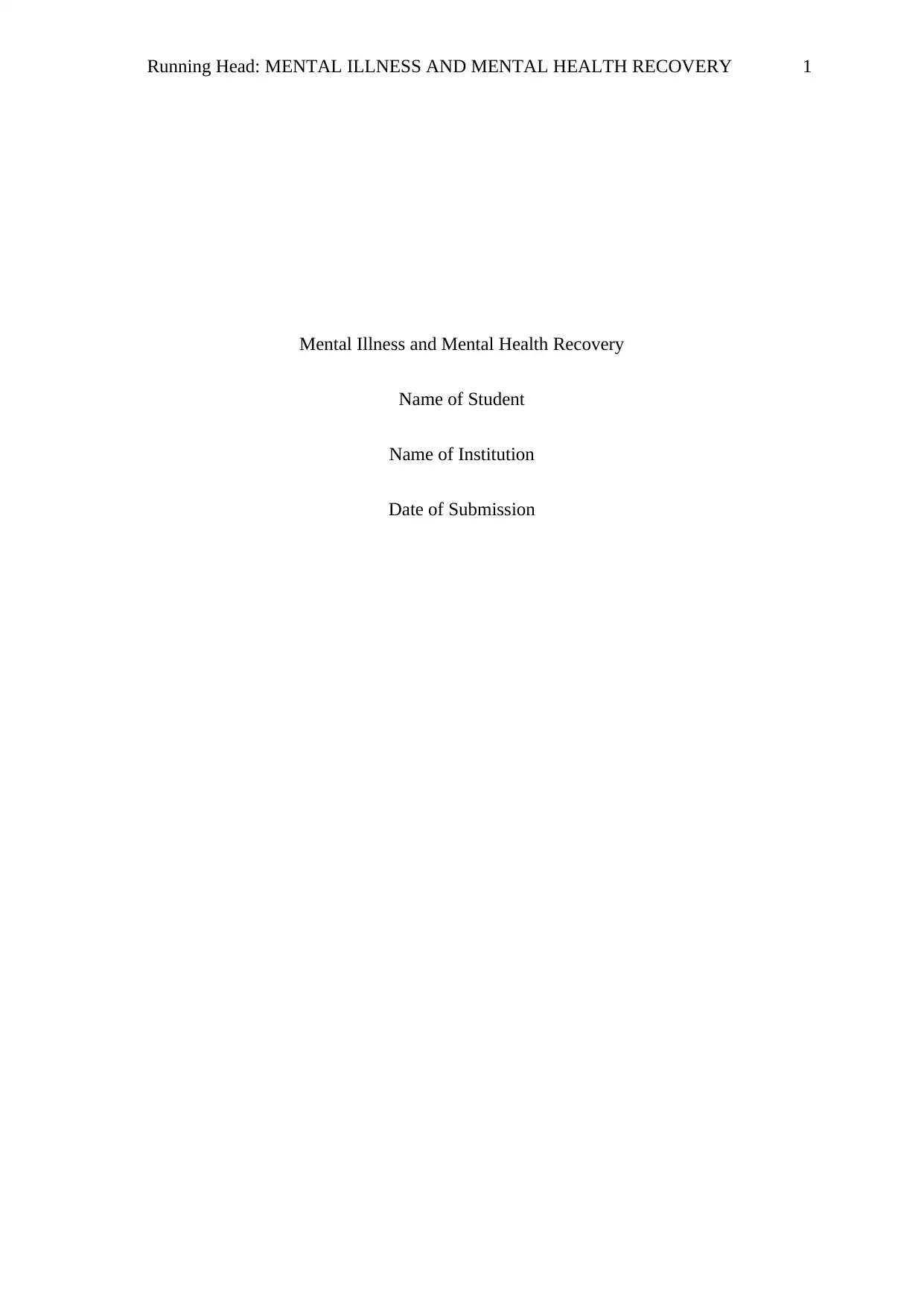
Running Head: MENTAL ILLNESS AND MENTAL HEALTH RECOVERY 1
Mental Illness and Mental Health Recovery
Name of Student
Name of Institution
Date of Submission
Mental Illness and Mental Health Recovery
Name of Student
Name of Institution
Date of Submission
Paraphrase This Document
Need a fresh take? Get an instant paraphrase of this document with our AI Paraphraser
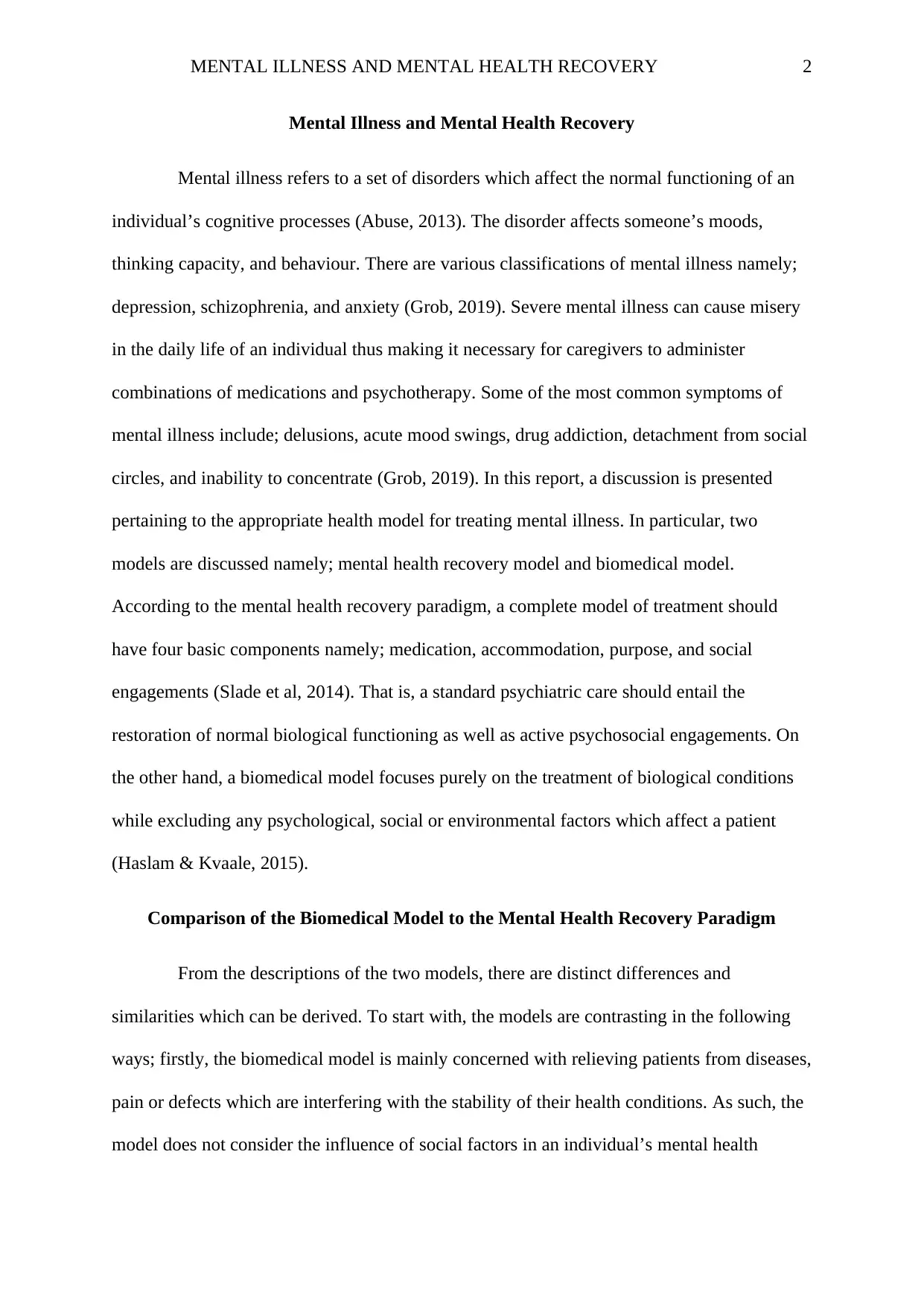
MENTAL ILLNESS AND MENTAL HEALTH RECOVERY 2
Mental Illness and Mental Health Recovery
Mental illness refers to a set of disorders which affect the normal functioning of an
individual’s cognitive processes (Abuse, 2013). The disorder affects someone’s moods,
thinking capacity, and behaviour. There are various classifications of mental illness namely;
depression, schizophrenia, and anxiety (Grob, 2019). Severe mental illness can cause misery
in the daily life of an individual thus making it necessary for caregivers to administer
combinations of medications and psychotherapy. Some of the most common symptoms of
mental illness include; delusions, acute mood swings, drug addiction, detachment from social
circles, and inability to concentrate (Grob, 2019). In this report, a discussion is presented
pertaining to the appropriate health model for treating mental illness. In particular, two
models are discussed namely; mental health recovery model and biomedical model.
According to the mental health recovery paradigm, a complete model of treatment should
have four basic components namely; medication, accommodation, purpose, and social
engagements (Slade et al, 2014). That is, a standard psychiatric care should entail the
restoration of normal biological functioning as well as active psychosocial engagements. On
the other hand, a biomedical model focuses purely on the treatment of biological conditions
while excluding any psychological, social or environmental factors which affect a patient
(Haslam & Kvaale, 2015).
Comparison of the Biomedical Model to the Mental Health Recovery Paradigm
From the descriptions of the two models, there are distinct differences and
similarities which can be derived. To start with, the models are contrasting in the following
ways; firstly, the biomedical model is mainly concerned with relieving patients from diseases,
pain or defects which are interfering with the stability of their health conditions. As such, the
model does not consider the influence of social factors in an individual’s mental health
Mental Illness and Mental Health Recovery
Mental illness refers to a set of disorders which affect the normal functioning of an
individual’s cognitive processes (Abuse, 2013). The disorder affects someone’s moods,
thinking capacity, and behaviour. There are various classifications of mental illness namely;
depression, schizophrenia, and anxiety (Grob, 2019). Severe mental illness can cause misery
in the daily life of an individual thus making it necessary for caregivers to administer
combinations of medications and psychotherapy. Some of the most common symptoms of
mental illness include; delusions, acute mood swings, drug addiction, detachment from social
circles, and inability to concentrate (Grob, 2019). In this report, a discussion is presented
pertaining to the appropriate health model for treating mental illness. In particular, two
models are discussed namely; mental health recovery model and biomedical model.
According to the mental health recovery paradigm, a complete model of treatment should
have four basic components namely; medication, accommodation, purpose, and social
engagements (Slade et al, 2014). That is, a standard psychiatric care should entail the
restoration of normal biological functioning as well as active psychosocial engagements. On
the other hand, a biomedical model focuses purely on the treatment of biological conditions
while excluding any psychological, social or environmental factors which affect a patient
(Haslam & Kvaale, 2015).
Comparison of the Biomedical Model to the Mental Health Recovery Paradigm
From the descriptions of the two models, there are distinct differences and
similarities which can be derived. To start with, the models are contrasting in the following
ways; firstly, the biomedical model is mainly concerned with relieving patients from diseases,
pain or defects which are interfering with the stability of their health conditions. As such, the
model does not consider the influence of social factors in an individual’s mental health
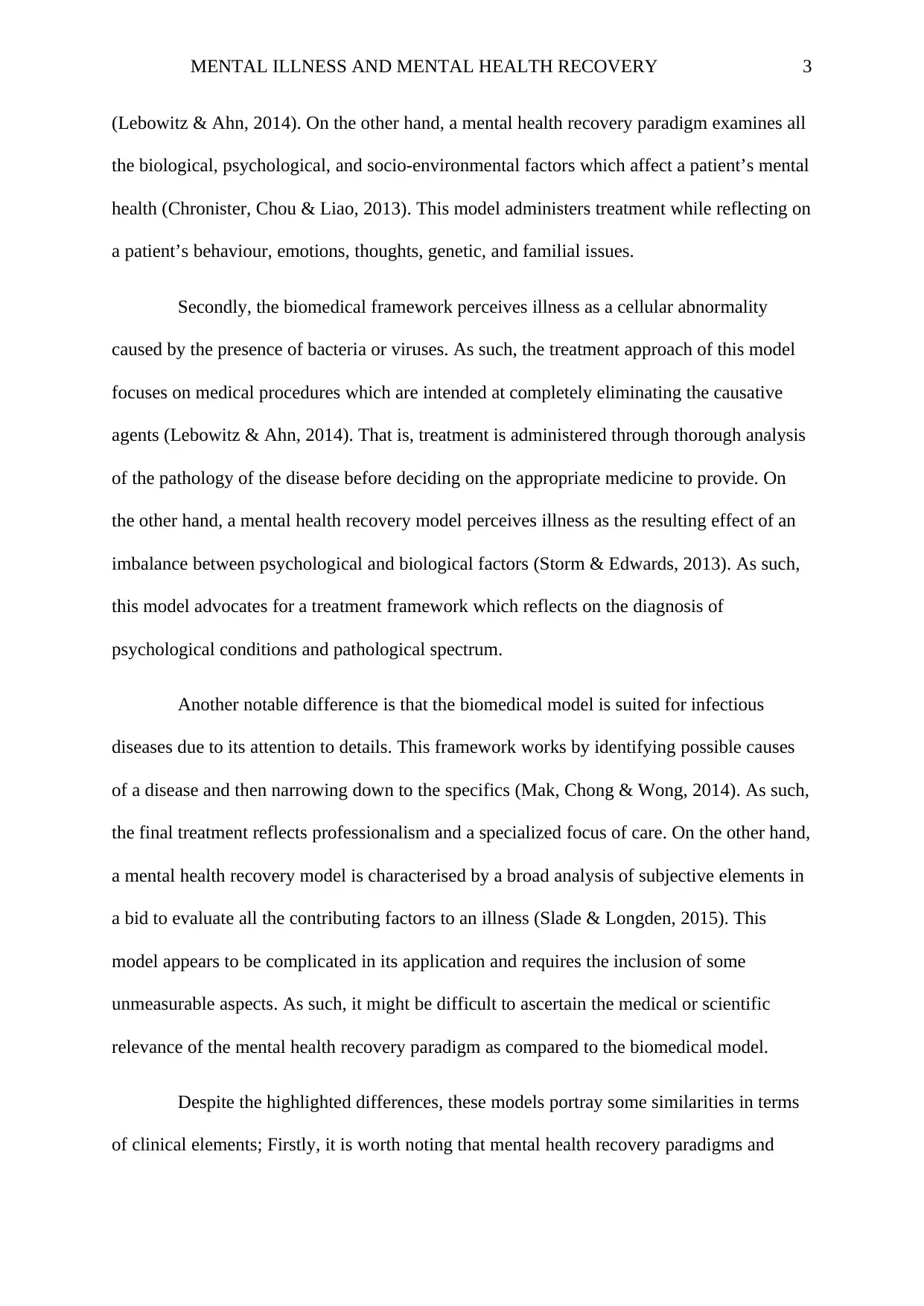
MENTAL ILLNESS AND MENTAL HEALTH RECOVERY 3
(Lebowitz & Ahn, 2014). On the other hand, a mental health recovery paradigm examines all
the biological, psychological, and socio-environmental factors which affect a patient’s mental
health (Chronister, Chou & Liao, 2013). This model administers treatment while reflecting on
a patient’s behaviour, emotions, thoughts, genetic, and familial issues.
Secondly, the biomedical framework perceives illness as a cellular abnormality
caused by the presence of bacteria or viruses. As such, the treatment approach of this model
focuses on medical procedures which are intended at completely eliminating the causative
agents (Lebowitz & Ahn, 2014). That is, treatment is administered through thorough analysis
of the pathology of the disease before deciding on the appropriate medicine to provide. On
the other hand, a mental health recovery model perceives illness as the resulting effect of an
imbalance between psychological and biological factors (Storm & Edwards, 2013). As such,
this model advocates for a treatment framework which reflects on the diagnosis of
psychological conditions and pathological spectrum.
Another notable difference is that the biomedical model is suited for infectious
diseases due to its attention to details. This framework works by identifying possible causes
of a disease and then narrowing down to the specifics (Mak, Chong & Wong, 2014). As such,
the final treatment reflects professionalism and a specialized focus of care. On the other hand,
a mental health recovery model is characterised by a broad analysis of subjective elements in
a bid to evaluate all the contributing factors to an illness (Slade & Longden, 2015). This
model appears to be complicated in its application and requires the inclusion of some
unmeasurable aspects. As such, it might be difficult to ascertain the medical or scientific
relevance of the mental health recovery paradigm as compared to the biomedical model.
Despite the highlighted differences, these models portray some similarities in terms
of clinical elements; Firstly, it is worth noting that mental health recovery paradigms and
(Lebowitz & Ahn, 2014). On the other hand, a mental health recovery paradigm examines all
the biological, psychological, and socio-environmental factors which affect a patient’s mental
health (Chronister, Chou & Liao, 2013). This model administers treatment while reflecting on
a patient’s behaviour, emotions, thoughts, genetic, and familial issues.
Secondly, the biomedical framework perceives illness as a cellular abnormality
caused by the presence of bacteria or viruses. As such, the treatment approach of this model
focuses on medical procedures which are intended at completely eliminating the causative
agents (Lebowitz & Ahn, 2014). That is, treatment is administered through thorough analysis
of the pathology of the disease before deciding on the appropriate medicine to provide. On
the other hand, a mental health recovery model perceives illness as the resulting effect of an
imbalance between psychological and biological factors (Storm & Edwards, 2013). As such,
this model advocates for a treatment framework which reflects on the diagnosis of
psychological conditions and pathological spectrum.
Another notable difference is that the biomedical model is suited for infectious
diseases due to its attention to details. This framework works by identifying possible causes
of a disease and then narrowing down to the specifics (Mak, Chong & Wong, 2014). As such,
the final treatment reflects professionalism and a specialized focus of care. On the other hand,
a mental health recovery model is characterised by a broad analysis of subjective elements in
a bid to evaluate all the contributing factors to an illness (Slade & Longden, 2015). This
model appears to be complicated in its application and requires the inclusion of some
unmeasurable aspects. As such, it might be difficult to ascertain the medical or scientific
relevance of the mental health recovery paradigm as compared to the biomedical model.
Despite the highlighted differences, these models portray some similarities in terms
of clinical elements; Firstly, it is worth noting that mental health recovery paradigms and
⊘ This is a preview!⊘
Do you want full access?
Subscribe today to unlock all pages.

Trusted by 1+ million students worldwide
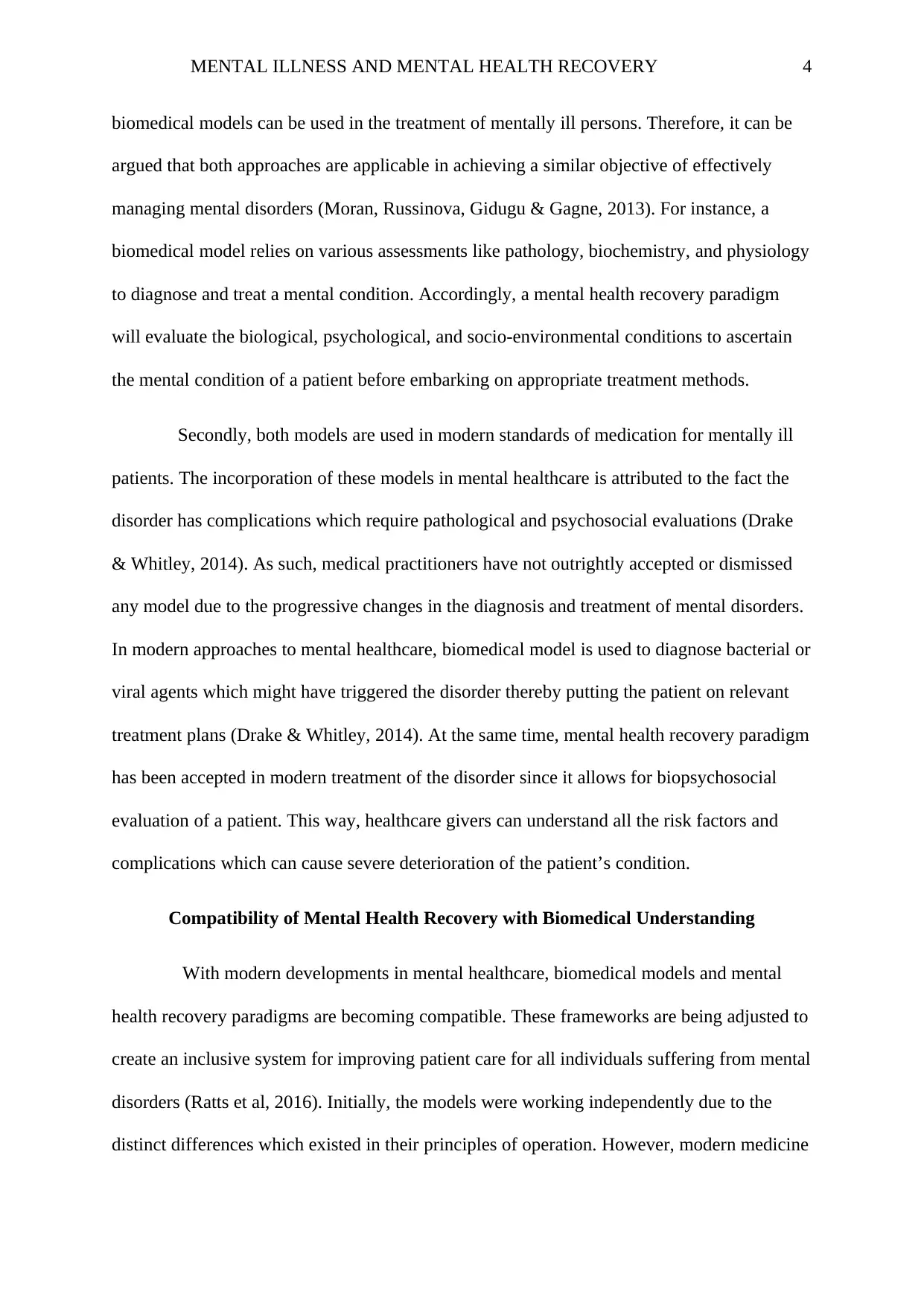
MENTAL ILLNESS AND MENTAL HEALTH RECOVERY 4
biomedical models can be used in the treatment of mentally ill persons. Therefore, it can be
argued that both approaches are applicable in achieving a similar objective of effectively
managing mental disorders (Moran, Russinova, Gidugu & Gagne, 2013). For instance, a
biomedical model relies on various assessments like pathology, biochemistry, and physiology
to diagnose and treat a mental condition. Accordingly, a mental health recovery paradigm
will evaluate the biological, psychological, and socio-environmental conditions to ascertain
the mental condition of a patient before embarking on appropriate treatment methods.
Secondly, both models are used in modern standards of medication for mentally ill
patients. The incorporation of these models in mental healthcare is attributed to the fact the
disorder has complications which require pathological and psychosocial evaluations (Drake
& Whitley, 2014). As such, medical practitioners have not outrightly accepted or dismissed
any model due to the progressive changes in the diagnosis and treatment of mental disorders.
In modern approaches to mental healthcare, biomedical model is used to diagnose bacterial or
viral agents which might have triggered the disorder thereby putting the patient on relevant
treatment plans (Drake & Whitley, 2014). At the same time, mental health recovery paradigm
has been accepted in modern treatment of the disorder since it allows for biopsychosocial
evaluation of a patient. This way, healthcare givers can understand all the risk factors and
complications which can cause severe deterioration of the patient’s condition.
Compatibility of Mental Health Recovery with Biomedical Understanding
With modern developments in mental healthcare, biomedical models and mental
health recovery paradigms are becoming compatible. These frameworks are being adjusted to
create an inclusive system for improving patient care for all individuals suffering from mental
disorders (Ratts et al, 2016). Initially, the models were working independently due to the
distinct differences which existed in their principles of operation. However, modern medicine
biomedical models can be used in the treatment of mentally ill persons. Therefore, it can be
argued that both approaches are applicable in achieving a similar objective of effectively
managing mental disorders (Moran, Russinova, Gidugu & Gagne, 2013). For instance, a
biomedical model relies on various assessments like pathology, biochemistry, and physiology
to diagnose and treat a mental condition. Accordingly, a mental health recovery paradigm
will evaluate the biological, psychological, and socio-environmental conditions to ascertain
the mental condition of a patient before embarking on appropriate treatment methods.
Secondly, both models are used in modern standards of medication for mentally ill
patients. The incorporation of these models in mental healthcare is attributed to the fact the
disorder has complications which require pathological and psychosocial evaluations (Drake
& Whitley, 2014). As such, medical practitioners have not outrightly accepted or dismissed
any model due to the progressive changes in the diagnosis and treatment of mental disorders.
In modern approaches to mental healthcare, biomedical model is used to diagnose bacterial or
viral agents which might have triggered the disorder thereby putting the patient on relevant
treatment plans (Drake & Whitley, 2014). At the same time, mental health recovery paradigm
has been accepted in modern treatment of the disorder since it allows for biopsychosocial
evaluation of a patient. This way, healthcare givers can understand all the risk factors and
complications which can cause severe deterioration of the patient’s condition.
Compatibility of Mental Health Recovery with Biomedical Understanding
With modern developments in mental healthcare, biomedical models and mental
health recovery paradigms are becoming compatible. These frameworks are being adjusted to
create an inclusive system for improving patient care for all individuals suffering from mental
disorders (Ratts et al, 2016). Initially, the models were working independently due to the
distinct differences which existed in their principles of operation. However, modern medicine
Paraphrase This Document
Need a fresh take? Get an instant paraphrase of this document with our AI Paraphraser
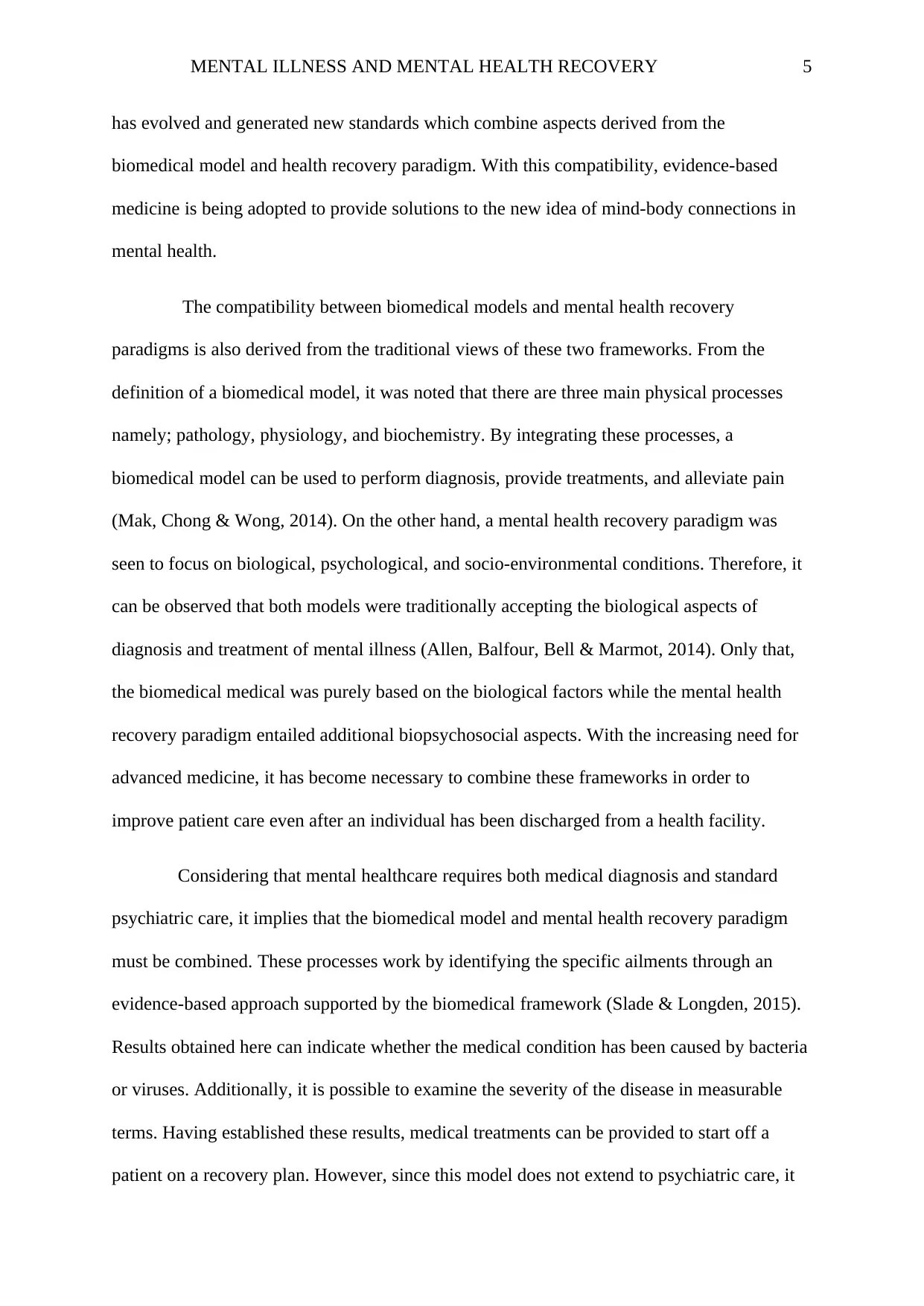
MENTAL ILLNESS AND MENTAL HEALTH RECOVERY 5
has evolved and generated new standards which combine aspects derived from the
biomedical model and health recovery paradigm. With this compatibility, evidence-based
medicine is being adopted to provide solutions to the new idea of mind-body connections in
mental health.
The compatibility between biomedical models and mental health recovery
paradigms is also derived from the traditional views of these two frameworks. From the
definition of a biomedical model, it was noted that there are three main physical processes
namely; pathology, physiology, and biochemistry. By integrating these processes, a
biomedical model can be used to perform diagnosis, provide treatments, and alleviate pain
(Mak, Chong & Wong, 2014). On the other hand, a mental health recovery paradigm was
seen to focus on biological, psychological, and socio-environmental conditions. Therefore, it
can be observed that both models were traditionally accepting the biological aspects of
diagnosis and treatment of mental illness (Allen, Balfour, Bell & Marmot, 2014). Only that,
the biomedical medical was purely based on the biological factors while the mental health
recovery paradigm entailed additional biopsychosocial aspects. With the increasing need for
advanced medicine, it has become necessary to combine these frameworks in order to
improve patient care even after an individual has been discharged from a health facility.
Considering that mental healthcare requires both medical diagnosis and standard
psychiatric care, it implies that the biomedical model and mental health recovery paradigm
must be combined. These processes work by identifying the specific ailments through an
evidence-based approach supported by the biomedical framework (Slade & Longden, 2015).
Results obtained here can indicate whether the medical condition has been caused by bacteria
or viruses. Additionally, it is possible to examine the severity of the disease in measurable
terms. Having established these results, medical treatments can be provided to start off a
patient on a recovery plan. However, since this model does not extend to psychiatric care, it
has evolved and generated new standards which combine aspects derived from the
biomedical model and health recovery paradigm. With this compatibility, evidence-based
medicine is being adopted to provide solutions to the new idea of mind-body connections in
mental health.
The compatibility between biomedical models and mental health recovery
paradigms is also derived from the traditional views of these two frameworks. From the
definition of a biomedical model, it was noted that there are three main physical processes
namely; pathology, physiology, and biochemistry. By integrating these processes, a
biomedical model can be used to perform diagnosis, provide treatments, and alleviate pain
(Mak, Chong & Wong, 2014). On the other hand, a mental health recovery paradigm was
seen to focus on biological, psychological, and socio-environmental conditions. Therefore, it
can be observed that both models were traditionally accepting the biological aspects of
diagnosis and treatment of mental illness (Allen, Balfour, Bell & Marmot, 2014). Only that,
the biomedical medical was purely based on the biological factors while the mental health
recovery paradigm entailed additional biopsychosocial aspects. With the increasing need for
advanced medicine, it has become necessary to combine these frameworks in order to
improve patient care even after an individual has been discharged from a health facility.
Considering that mental healthcare requires both medical diagnosis and standard
psychiatric care, it implies that the biomedical model and mental health recovery paradigm
must be combined. These processes work by identifying the specific ailments through an
evidence-based approach supported by the biomedical framework (Slade & Longden, 2015).
Results obtained here can indicate whether the medical condition has been caused by bacteria
or viruses. Additionally, it is possible to examine the severity of the disease in measurable
terms. Having established these results, medical treatments can be provided to start off a
patient on a recovery plan. However, since this model does not extend to psychiatric care, it
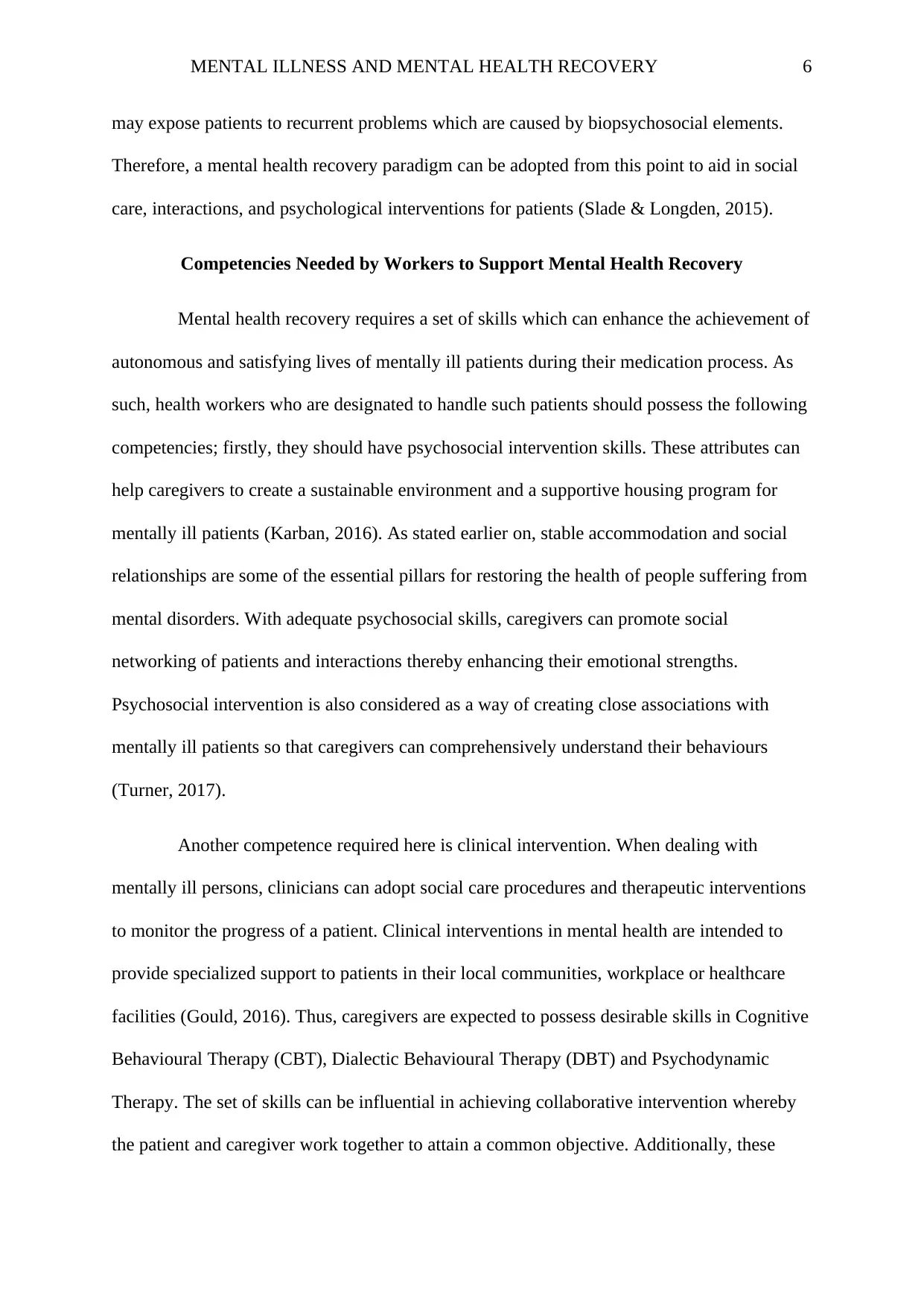
MENTAL ILLNESS AND MENTAL HEALTH RECOVERY 6
may expose patients to recurrent problems which are caused by biopsychosocial elements.
Therefore, a mental health recovery paradigm can be adopted from this point to aid in social
care, interactions, and psychological interventions for patients (Slade & Longden, 2015).
Competencies Needed by Workers to Support Mental Health Recovery
Mental health recovery requires a set of skills which can enhance the achievement of
autonomous and satisfying lives of mentally ill patients during their medication process. As
such, health workers who are designated to handle such patients should possess the following
competencies; firstly, they should have psychosocial intervention skills. These attributes can
help caregivers to create a sustainable environment and a supportive housing program for
mentally ill patients (Karban, 2016). As stated earlier on, stable accommodation and social
relationships are some of the essential pillars for restoring the health of people suffering from
mental disorders. With adequate psychosocial skills, caregivers can promote social
networking of patients and interactions thereby enhancing their emotional strengths.
Psychosocial intervention is also considered as a way of creating close associations with
mentally ill patients so that caregivers can comprehensively understand their behaviours
(Turner, 2017).
Another competence required here is clinical intervention. When dealing with
mentally ill persons, clinicians can adopt social care procedures and therapeutic interventions
to monitor the progress of a patient. Clinical interventions in mental health are intended to
provide specialized support to patients in their local communities, workplace or healthcare
facilities (Gould, 2016). Thus, caregivers are expected to possess desirable skills in Cognitive
Behavioural Therapy (CBT), Dialectic Behavioural Therapy (DBT) and Psychodynamic
Therapy. The set of skills can be influential in achieving collaborative intervention whereby
the patient and caregiver work together to attain a common objective. Additionally, these
may expose patients to recurrent problems which are caused by biopsychosocial elements.
Therefore, a mental health recovery paradigm can be adopted from this point to aid in social
care, interactions, and psychological interventions for patients (Slade & Longden, 2015).
Competencies Needed by Workers to Support Mental Health Recovery
Mental health recovery requires a set of skills which can enhance the achievement of
autonomous and satisfying lives of mentally ill patients during their medication process. As
such, health workers who are designated to handle such patients should possess the following
competencies; firstly, they should have psychosocial intervention skills. These attributes can
help caregivers to create a sustainable environment and a supportive housing program for
mentally ill patients (Karban, 2016). As stated earlier on, stable accommodation and social
relationships are some of the essential pillars for restoring the health of people suffering from
mental disorders. With adequate psychosocial skills, caregivers can promote social
networking of patients and interactions thereby enhancing their emotional strengths.
Psychosocial intervention is also considered as a way of creating close associations with
mentally ill patients so that caregivers can comprehensively understand their behaviours
(Turner, 2017).
Another competence required here is clinical intervention. When dealing with
mentally ill persons, clinicians can adopt social care procedures and therapeutic interventions
to monitor the progress of a patient. Clinical interventions in mental health are intended to
provide specialized support to patients in their local communities, workplace or healthcare
facilities (Gould, 2016). Thus, caregivers are expected to possess desirable skills in Cognitive
Behavioural Therapy (CBT), Dialectic Behavioural Therapy (DBT) and Psychodynamic
Therapy. The set of skills can be influential in achieving collaborative intervention whereby
the patient and caregiver work together to attain a common objective. Additionally, these
⊘ This is a preview!⊘
Do you want full access?
Subscribe today to unlock all pages.

Trusted by 1+ million students worldwide
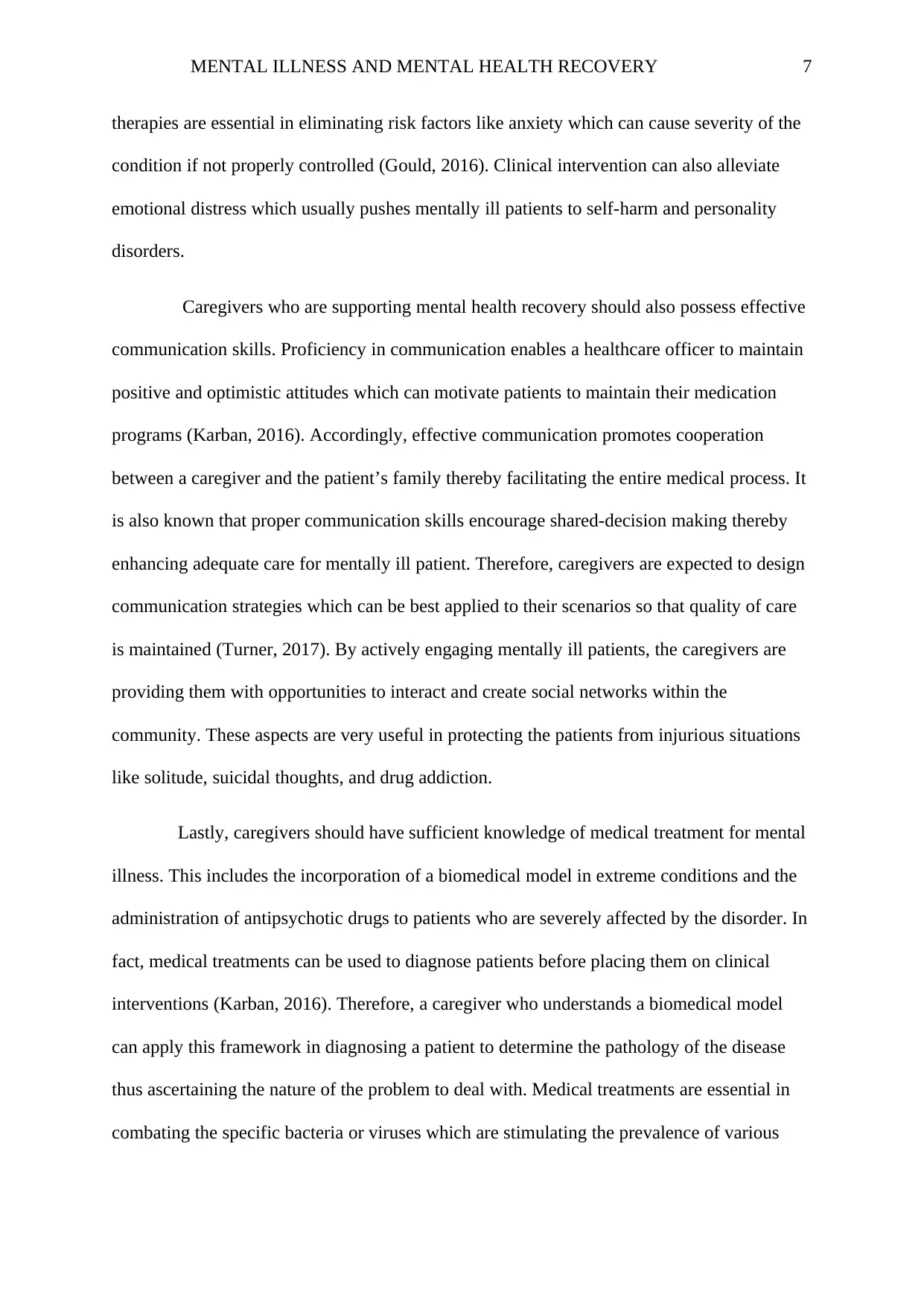
MENTAL ILLNESS AND MENTAL HEALTH RECOVERY 7
therapies are essential in eliminating risk factors like anxiety which can cause severity of the
condition if not properly controlled (Gould, 2016). Clinical intervention can also alleviate
emotional distress which usually pushes mentally ill patients to self-harm and personality
disorders.
Caregivers who are supporting mental health recovery should also possess effective
communication skills. Proficiency in communication enables a healthcare officer to maintain
positive and optimistic attitudes which can motivate patients to maintain their medication
programs (Karban, 2016). Accordingly, effective communication promotes cooperation
between a caregiver and the patient’s family thereby facilitating the entire medical process. It
is also known that proper communication skills encourage shared-decision making thereby
enhancing adequate care for mentally ill patient. Therefore, caregivers are expected to design
communication strategies which can be best applied to their scenarios so that quality of care
is maintained (Turner, 2017). By actively engaging mentally ill patients, the caregivers are
providing them with opportunities to interact and create social networks within the
community. These aspects are very useful in protecting the patients from injurious situations
like solitude, suicidal thoughts, and drug addiction.
Lastly, caregivers should have sufficient knowledge of medical treatment for mental
illness. This includes the incorporation of a biomedical model in extreme conditions and the
administration of antipsychotic drugs to patients who are severely affected by the disorder. In
fact, medical treatments can be used to diagnose patients before placing them on clinical
interventions (Karban, 2016). Therefore, a caregiver who understands a biomedical model
can apply this framework in diagnosing a patient to determine the pathology of the disease
thus ascertaining the nature of the problem to deal with. Medical treatments are essential in
combating the specific bacteria or viruses which are stimulating the prevalence of various
therapies are essential in eliminating risk factors like anxiety which can cause severity of the
condition if not properly controlled (Gould, 2016). Clinical intervention can also alleviate
emotional distress which usually pushes mentally ill patients to self-harm and personality
disorders.
Caregivers who are supporting mental health recovery should also possess effective
communication skills. Proficiency in communication enables a healthcare officer to maintain
positive and optimistic attitudes which can motivate patients to maintain their medication
programs (Karban, 2016). Accordingly, effective communication promotes cooperation
between a caregiver and the patient’s family thereby facilitating the entire medical process. It
is also known that proper communication skills encourage shared-decision making thereby
enhancing adequate care for mentally ill patient. Therefore, caregivers are expected to design
communication strategies which can be best applied to their scenarios so that quality of care
is maintained (Turner, 2017). By actively engaging mentally ill patients, the caregivers are
providing them with opportunities to interact and create social networks within the
community. These aspects are very useful in protecting the patients from injurious situations
like solitude, suicidal thoughts, and drug addiction.
Lastly, caregivers should have sufficient knowledge of medical treatment for mental
illness. This includes the incorporation of a biomedical model in extreme conditions and the
administration of antipsychotic drugs to patients who are severely affected by the disorder. In
fact, medical treatments can be used to diagnose patients before placing them on clinical
interventions (Karban, 2016). Therefore, a caregiver who understands a biomedical model
can apply this framework in diagnosing a patient to determine the pathology of the disease
thus ascertaining the nature of the problem to deal with. Medical treatments are essential in
combating the specific bacteria or viruses which are stimulating the prevalence of various
Paraphrase This Document
Need a fresh take? Get an instant paraphrase of this document with our AI Paraphraser
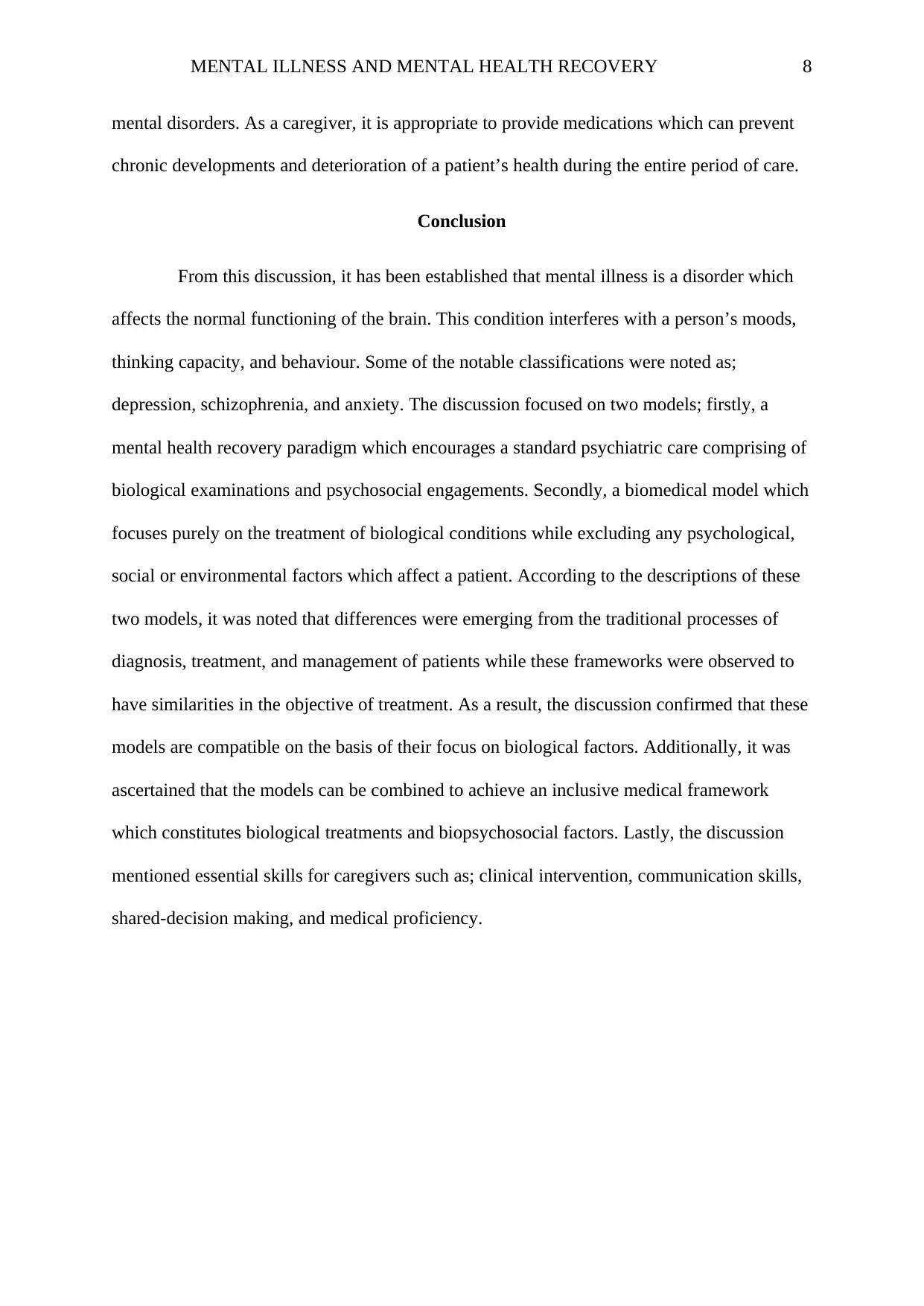
MENTAL ILLNESS AND MENTAL HEALTH RECOVERY 8
mental disorders. As a caregiver, it is appropriate to provide medications which can prevent
chronic developments and deterioration of a patient’s health during the entire period of care.
Conclusion
From this discussion, it has been established that mental illness is a disorder which
affects the normal functioning of the brain. This condition interferes with a person’s moods,
thinking capacity, and behaviour. Some of the notable classifications were noted as;
depression, schizophrenia, and anxiety. The discussion focused on two models; firstly, a
mental health recovery paradigm which encourages a standard psychiatric care comprising of
biological examinations and psychosocial engagements. Secondly, a biomedical model which
focuses purely on the treatment of biological conditions while excluding any psychological,
social or environmental factors which affect a patient. According to the descriptions of these
two models, it was noted that differences were emerging from the traditional processes of
diagnosis, treatment, and management of patients while these frameworks were observed to
have similarities in the objective of treatment. As a result, the discussion confirmed that these
models are compatible on the basis of their focus on biological factors. Additionally, it was
ascertained that the models can be combined to achieve an inclusive medical framework
which constitutes biological treatments and biopsychosocial factors. Lastly, the discussion
mentioned essential skills for caregivers such as; clinical intervention, communication skills,
shared-decision making, and medical proficiency.
mental disorders. As a caregiver, it is appropriate to provide medications which can prevent
chronic developments and deterioration of a patient’s health during the entire period of care.
Conclusion
From this discussion, it has been established that mental illness is a disorder which
affects the normal functioning of the brain. This condition interferes with a person’s moods,
thinking capacity, and behaviour. Some of the notable classifications were noted as;
depression, schizophrenia, and anxiety. The discussion focused on two models; firstly, a
mental health recovery paradigm which encourages a standard psychiatric care comprising of
biological examinations and psychosocial engagements. Secondly, a biomedical model which
focuses purely on the treatment of biological conditions while excluding any psychological,
social or environmental factors which affect a patient. According to the descriptions of these
two models, it was noted that differences were emerging from the traditional processes of
diagnosis, treatment, and management of patients while these frameworks were observed to
have similarities in the objective of treatment. As a result, the discussion confirmed that these
models are compatible on the basis of their focus on biological factors. Additionally, it was
ascertained that the models can be combined to achieve an inclusive medical framework
which constitutes biological treatments and biopsychosocial factors. Lastly, the discussion
mentioned essential skills for caregivers such as; clinical intervention, communication skills,
shared-decision making, and medical proficiency.
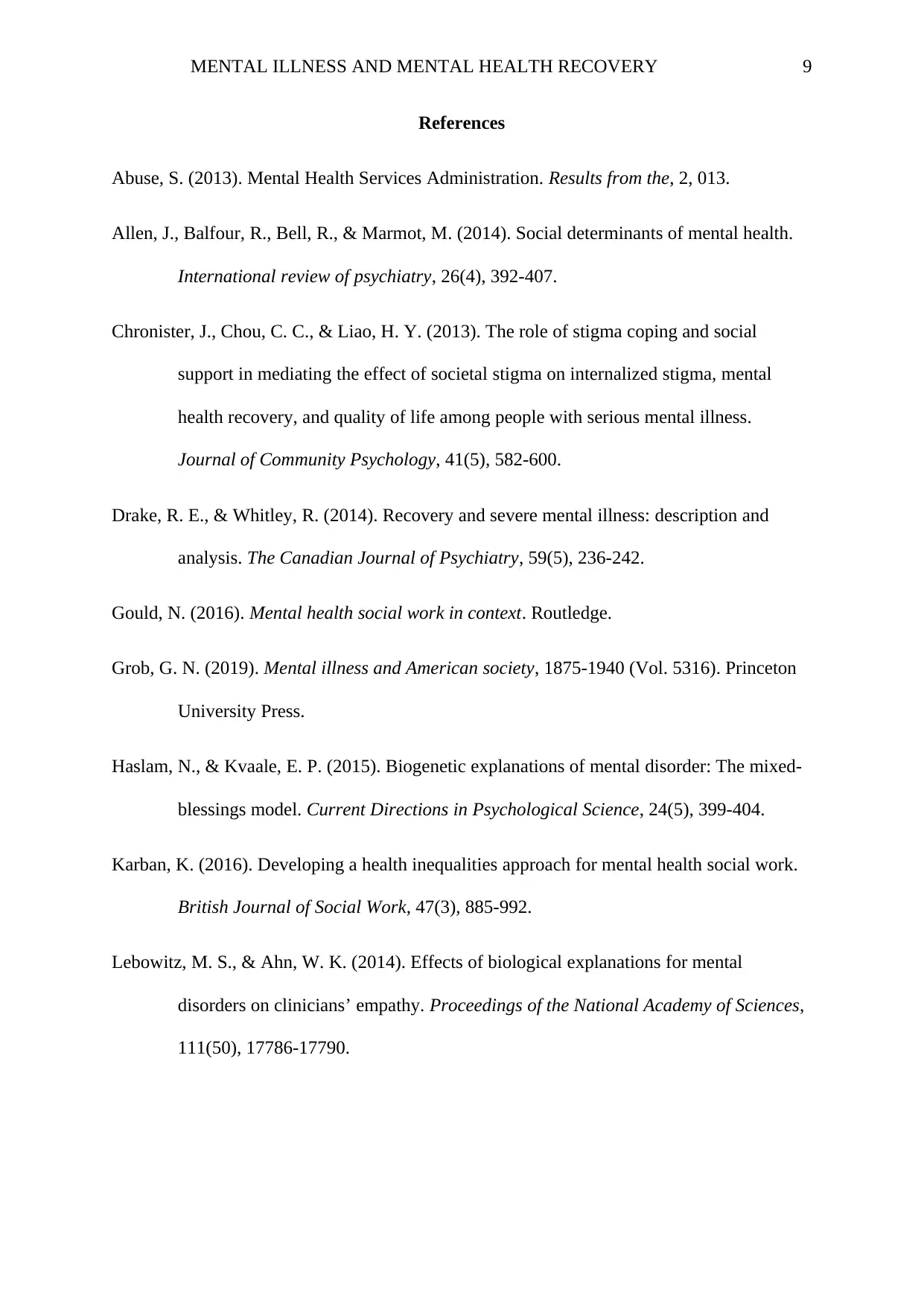
MENTAL ILLNESS AND MENTAL HEALTH RECOVERY 9
References
Abuse, S. (2013). Mental Health Services Administration. Results from the, 2, 013.
Allen, J., Balfour, R., Bell, R., & Marmot, M. (2014). Social determinants of mental health.
International review of psychiatry, 26(4), 392-407.
Chronister, J., Chou, C. C., & Liao, H. Y. (2013). The role of stigma coping and social
support in mediating the effect of societal stigma on internalized stigma, mental
health recovery, and quality of life among people with serious mental illness.
Journal of Community Psychology, 41(5), 582-600.
Drake, R. E., & Whitley, R. (2014). Recovery and severe mental illness: description and
analysis. The Canadian Journal of Psychiatry, 59(5), 236-242.
Gould, N. (2016). Mental health social work in context. Routledge.
Grob, G. N. (2019). Mental illness and American society, 1875-1940 (Vol. 5316). Princeton
University Press.
Haslam, N., & Kvaale, E. P. (2015). Biogenetic explanations of mental disorder: The mixed-
blessings model. Current Directions in Psychological Science, 24(5), 399-404.
Karban, K. (2016). Developing a health inequalities approach for mental health social work.
British Journal of Social Work, 47(3), 885-992.
Lebowitz, M. S., & Ahn, W. K. (2014). Effects of biological explanations for mental
disorders on clinicians’ empathy. Proceedings of the National Academy of Sciences,
111(50), 17786-17790.
References
Abuse, S. (2013). Mental Health Services Administration. Results from the, 2, 013.
Allen, J., Balfour, R., Bell, R., & Marmot, M. (2014). Social determinants of mental health.
International review of psychiatry, 26(4), 392-407.
Chronister, J., Chou, C. C., & Liao, H. Y. (2013). The role of stigma coping and social
support in mediating the effect of societal stigma on internalized stigma, mental
health recovery, and quality of life among people with serious mental illness.
Journal of Community Psychology, 41(5), 582-600.
Drake, R. E., & Whitley, R. (2014). Recovery and severe mental illness: description and
analysis. The Canadian Journal of Psychiatry, 59(5), 236-242.
Gould, N. (2016). Mental health social work in context. Routledge.
Grob, G. N. (2019). Mental illness and American society, 1875-1940 (Vol. 5316). Princeton
University Press.
Haslam, N., & Kvaale, E. P. (2015). Biogenetic explanations of mental disorder: The mixed-
blessings model. Current Directions in Psychological Science, 24(5), 399-404.
Karban, K. (2016). Developing a health inequalities approach for mental health social work.
British Journal of Social Work, 47(3), 885-992.
Lebowitz, M. S., & Ahn, W. K. (2014). Effects of biological explanations for mental
disorders on clinicians’ empathy. Proceedings of the National Academy of Sciences,
111(50), 17786-17790.
⊘ This is a preview!⊘
Do you want full access?
Subscribe today to unlock all pages.

Trusted by 1+ million students worldwide
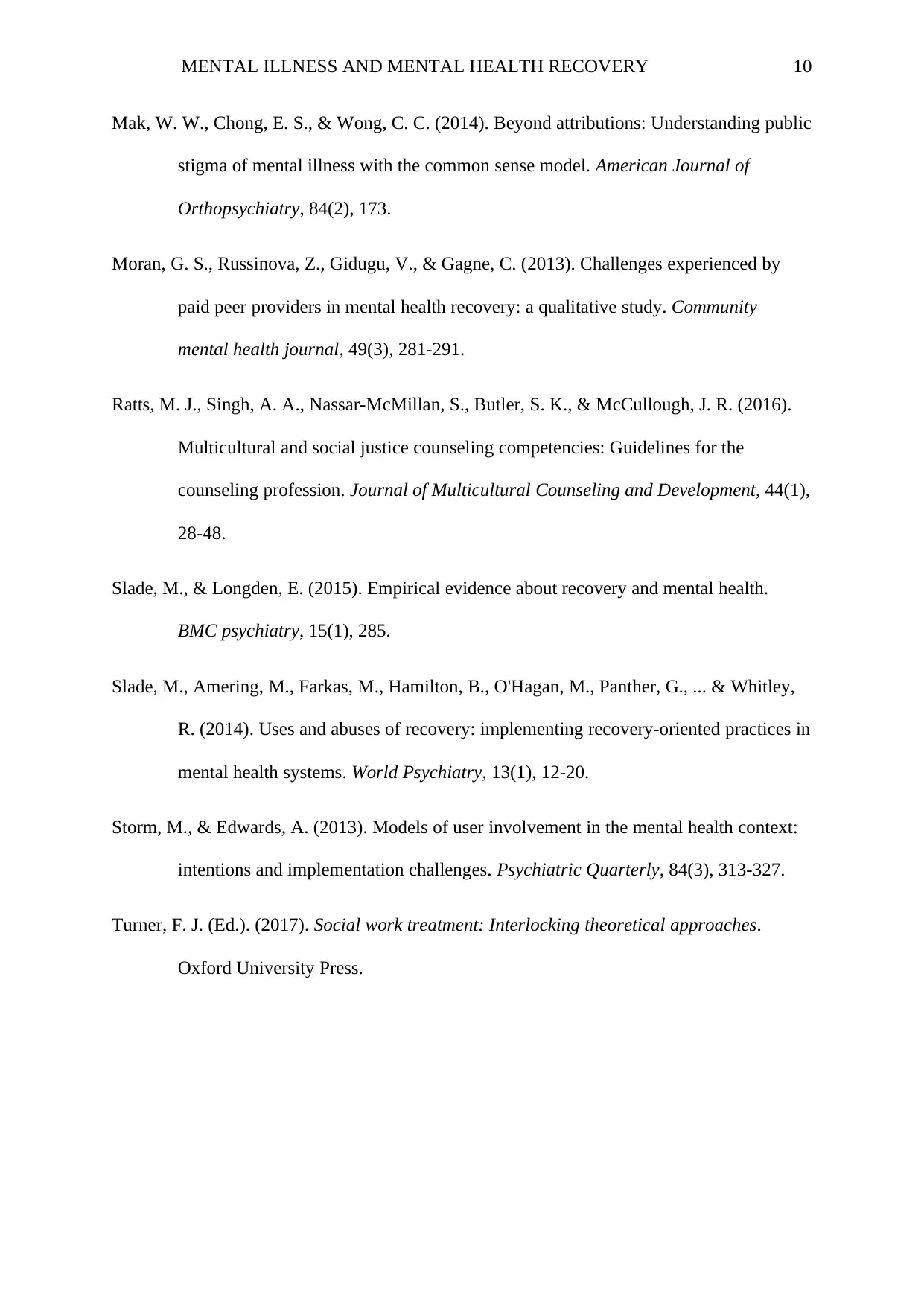
MENTAL ILLNESS AND MENTAL HEALTH RECOVERY 10
Mak, W. W., Chong, E. S., & Wong, C. C. (2014). Beyond attributions: Understanding public
stigma of mental illness with the common sense model. American Journal of
Orthopsychiatry, 84(2), 173.
Moran, G. S., Russinova, Z., Gidugu, V., & Gagne, C. (2013). Challenges experienced by
paid peer providers in mental health recovery: a qualitative study. Community
mental health journal, 49(3), 281-291.
Ratts, M. J., Singh, A. A., Nassar‐McMillan, S., Butler, S. K., & McCullough, J. R. (2016).
Multicultural and social justice counseling competencies: Guidelines for the
counseling profession. Journal of Multicultural Counseling and Development, 44(1),
28-48.
Slade, M., & Longden, E. (2015). Empirical evidence about recovery and mental health.
BMC psychiatry, 15(1), 285.
Slade, M., Amering, M., Farkas, M., Hamilton, B., O'Hagan, M., Panther, G., ... & Whitley,
R. (2014). Uses and abuses of recovery: implementing recovery‐oriented practices in
mental health systems. World Psychiatry, 13(1), 12-20.
Storm, M., & Edwards, A. (2013). Models of user involvement in the mental health context:
intentions and implementation challenges. Psychiatric Quarterly, 84(3), 313-327.
Turner, F. J. (Ed.). (2017). Social work treatment: Interlocking theoretical approaches.
Oxford University Press.
Mak, W. W., Chong, E. S., & Wong, C. C. (2014). Beyond attributions: Understanding public
stigma of mental illness with the common sense model. American Journal of
Orthopsychiatry, 84(2), 173.
Moran, G. S., Russinova, Z., Gidugu, V., & Gagne, C. (2013). Challenges experienced by
paid peer providers in mental health recovery: a qualitative study. Community
mental health journal, 49(3), 281-291.
Ratts, M. J., Singh, A. A., Nassar‐McMillan, S., Butler, S. K., & McCullough, J. R. (2016).
Multicultural and social justice counseling competencies: Guidelines for the
counseling profession. Journal of Multicultural Counseling and Development, 44(1),
28-48.
Slade, M., & Longden, E. (2015). Empirical evidence about recovery and mental health.
BMC psychiatry, 15(1), 285.
Slade, M., Amering, M., Farkas, M., Hamilton, B., O'Hagan, M., Panther, G., ... & Whitley,
R. (2014). Uses and abuses of recovery: implementing recovery‐oriented practices in
mental health systems. World Psychiatry, 13(1), 12-20.
Storm, M., & Edwards, A. (2013). Models of user involvement in the mental health context:
intentions and implementation challenges. Psychiatric Quarterly, 84(3), 313-327.
Turner, F. J. (Ed.). (2017). Social work treatment: Interlocking theoretical approaches.
Oxford University Press.
1 out of 10
Related Documents
Your All-in-One AI-Powered Toolkit for Academic Success.
+13062052269
info@desklib.com
Available 24*7 on WhatsApp / Email
![[object Object]](/_next/static/media/star-bottom.7253800d.svg)
Unlock your academic potential
Copyright © 2020–2025 A2Z Services. All Rights Reserved. Developed and managed by ZUCOL.





